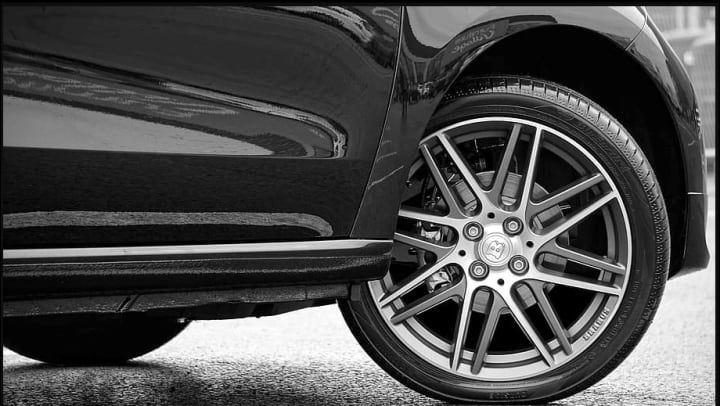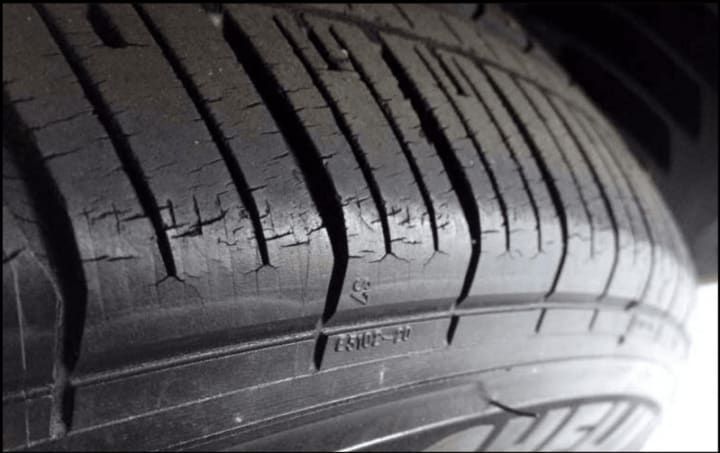How To Prevent Dry Rot in Stored Tires

Dry rotting is a natural process that gradually damages tires. It is caused by the oils in the rubber that makes up tires slowly leaching out of them. This causes the tire to become brittle and more prone to blowouts when driving on them.
Although dry rotting occurs in all tires, the degradation process is sped up when tires are left for an extended period of time without being driven on. This is because the pressure exerted from driving works oils back into the tires so they leach out more slowly.
The downside of this is that tires that are kept in storage for an extended period of time, whether attached to or removed from a vehicle, are more likely to suffer from dry rotting.
In order to combat this from happening to you, here are the ways that you can store tires in a way that prevents dry rotting.
1. Clean your tires before they go into storage
Cleaning your tires before they go into storage can slow down the rotting process.
This is because when mud and other debris dries on the surface of tires it pulls some of their oils out of it. It is for much the same reason that licking your lips can lead to drier lips.
It’s best to just use water and a sponge to clean your tires.
Do not use specially made tire cleaning soaps if you plan to put your tires into storage soon after cleaning them. These soaps are designed to be “ridden” into the tire and will dry a tire out further if this does not happen.
2. Keep tires out of direct sunlight
UV rays accelerate the rate that dry rotting occurs in tires. It’s therefore vital that you store a vehicle , or tires, out of direct sunlight. Since UV rays can penetrate glass windows, you want to pick a storage space where sunbeams will not shine directly on tires.
If such a space is unavailable, then it may be worth investing in an opaque cover to protect your tires from UV exposure. Although car covers are available to prevent the body of a car from getting too hot, these usually stop just above the tires. You therefore should buy an oversized one to make sure that your tires are covered by it.
3. Try to store your vehicle at a constant temperature
Excessive heat, excessive cold, and large swings in temperature lead to dry rotting in tires.
Temperatures need to be consistently above 90 degrees Fahrenheit, below 40 degrees Fahrenheit or have swings of over 70 degrees Fahrenheit in order to significantly speed up the dry rotting process.
Keeping your vehicle indoors should mitigate the chances of this happening. This is one major advantage of keeping your vehicle in a storage unit rather than storing it outside in your front yard for an extended period of time.
If you live in a particularly hot or cold climate then you may want to consider temperature controlled storage facilities for your vehicle or tires. However, in most cases indoor storage will be sufficient to mitigate excessive swings in temperature.
4. Keep removed tires in sealed bags
Since exposure to oxygen can contribute to tires dry rotting you should, where possible, keep tires in a sealed environment.
For this reason, and to reduce flat spotting and uneven wear on tires, we would recommend removing tires from your vehicle if you plan on storing it for more than 6 months.
Removed tires should be kept in sealed bags. Although automotive shops do sell specialist tire bags, these are often very overpriced. You can protect removed tires from dry rotting almost as well by keeping them in heavy duty plastic bags that are duct taped securely.
How to check if dry rotting has occurred in my tires
Since dry rotting will naturally occur in tires that have been stationary for an extended period of time, it’s worth checking your tires for signs of dry rotting when you take your vehicle out of storage.
Signs of dry rotting include:
- Tires developing a grayish “washed out” color
- Visible cracks in the tire
- Tires losing their slight sponginess to the touch and feeling more like leather than rubber

If you notice these signs, then it might be worth taking a vehicle to the mechanic so they can inspect the tires.
In the vast majority of cases, tires can be restored to their full health. However, if there are large cracks on the sidewall of the tire, or if the rubber has reached a certain level of brittleness, then they will need to be replaced.
This article was contributed by Mike Skoropad. Mike is the co-founder of tire retailers and maintenance specialists United Tires.
About United Tires
United Tires is a young, but quickly growing company specializing in providing quality used tires both online and for the convenience of local customers. Their used tires go through rigorous quality control checks to make sure you get top of the line tires.
Looking for more tips? Check out our other blogs:
Please visit our Storage FAQ page for more information about Storage Units. Storage Units in Toronto, Halifax, and Over 30 Other Locations Across Canada. Apple Self Storage has 36 storage unit facilities across Ontario and Atlantic Canada. Our facility managers provide friendly, personalized advice to help you pick the right self storage solution. Our flexible plans offer the perfect solution for personal, student and business needs. At Apple Self Storage you can be sure satisfaction is always 100% guaranteed. For more information click here to contact us or call 1-866-417-1005 to find your storage solution today.
The post How To Prevent Dry Rot in Stored Tires appeared first on Apple Storage.






